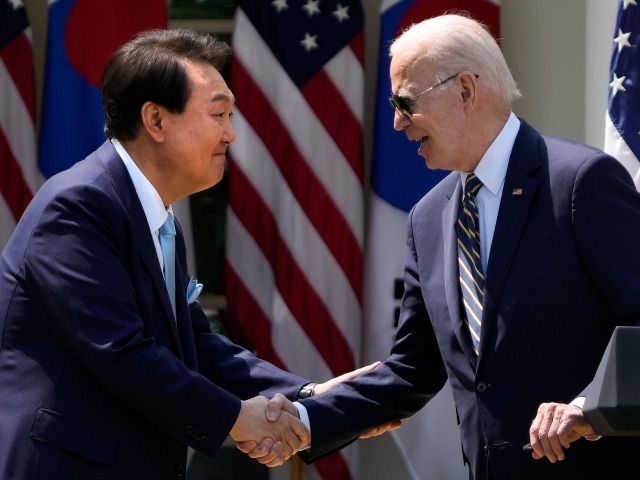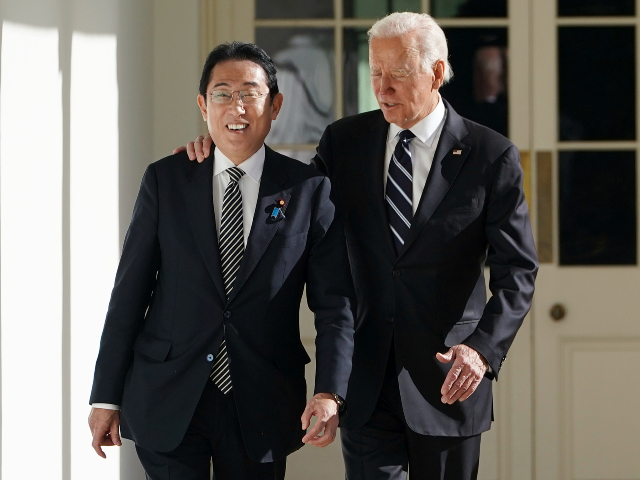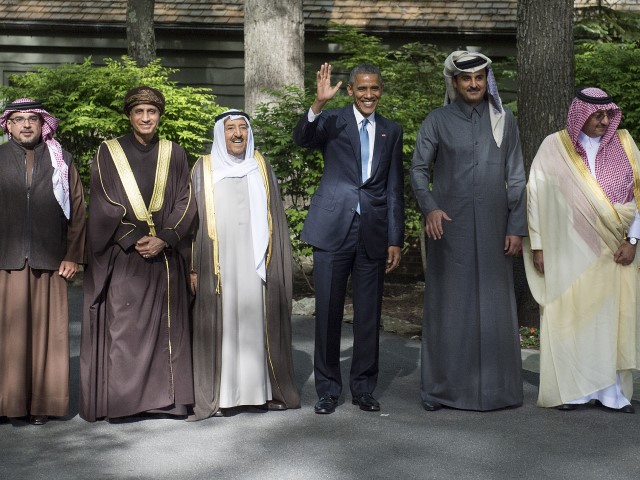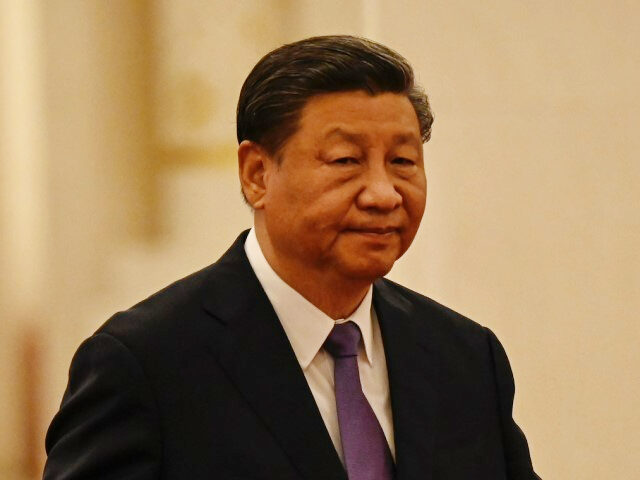Chinese officials on Thursday seethed over the trilateral United States-South Korea-Japan summit scheduled to be held at Camp David, Maryland, on Friday, denouncing the United States for scheming to create an “Asian NATO” and warning South Korea it could pay a steep price for angering China.
The Camp David summit is expected to include a security dialogue between President Joe Biden, South Korean President Yoon Suk-yeol, and Japanese Prime Minister Kishida Fumio. This will feature discussions about China’s territorial aggression, China’s potential invasion of Taiwan, and North Korea’s ballistic missile threat. Proposed responses are reported to include improved intelligence sharing and more joint military exercises.

President Joe Biden (R) and South Korean President Yoon Suk-yeol shake hands during a joint press conference in the Rose Garden at the White House, April 26, 2023 in Washington, DC. (Drew Angerer/Getty Images)

President Joe Biden and Japanese Prime Minister Fumio Kishida walk along the Colonnade of the White House, Friday, Jan. 13, 2023, in Washington. (Mandel Ngan/Pool Photo via AP)
Although the United States, South Korea, and Japan have discussed their mutual security concerns at various international conferences, Friday’s meeting will be the first formal trilateral summit between them and the first international meeting to be held at Camp David since 2015.

President Barack Obama waves alongside delegation leaders following the Gulf Cooperation Council-U.S. summit on May 14, 2015 at Camp David, Maryland. (Kevin Dietsch – Pool/Getty)
China was infuriated by the trilateral meeting as soon as it was announced.
“China has noticed some exclusionary groupings being assembled for the so-called ‘regional security’ only to intensify antagonism and undermine the strategic security of other countries. China firmly opposes such practices,” fumed the Chinese embassy in Washington.
China’s state-run Global Times on Wednesday denounced the Camp David summit as a “mini-NATO” that will be “destructive to regional security.”
The Chinese Communist paper fumbled to find any concrete reason for criticizing the summit since the mutual security concerns of the three participating nations are long-standing and well-known, and the editors did not wish to mention any of the aggressive behavior in the South China Sea that gives all three countries good reason to view Beijing as a serious threat.
The Global Times eventually settled on quoting North Korean officials who railed that the Americans were pushing Asia to “the verge of a nuclear war outbreak” by helping South Korea shore up its defenses against Pyongyang’s incessant threats.
“Some experts warned that the US, through the trilateral summit, aims not only to establish a new multilateral military group or ‘mini clique’ in the Asia-Pacific region but also seeks to reinforce the so-called economic and technological ‘new cold war’ through an enhanced geopolitical cold war,” the Global Times huffed, throwing down every Chinese Foreign Ministry talking point in its inventory.
Another Global Times editorial on Wednesday raved at the South Koreans for helping to launch the “new cold war” and threatened Seoul with dire consequences for turning its back on China:
In this context, we wish to particularly caution South Korea, as it stands as a crucial variable propelling the emergence of “new cold war” tendencies in the region. We highly doubt whether the South Korean authorities truly understand what this muddy water they are wading into means for South Korea. If they were fully aware, they wouldn’t exhibit the current level of excitement and eagerness upon receiving their “Camp David summit” ticket, resembling a kindergarten child receiving a sticker from their teacher. Instead, they would be filled with a sense of deep trepidation and caution, as if on the edge of an abyss or treading on thin ice. They would find this ticket extremely challenging to handle.
Compared to the other two members with ulterior motives in the alliance of the US, the perception of the regional situation and global situation displayed by the South Korean authorities appears to be both radical and simplistic. Based on such perception, the choices made are unlikely to navigate the exceedingly complex geopolitical reality of Northeast Asia. As a major victim of the “remnants of the Cold War,” South Korea should have been one of the most vigilant and concerned countries against the “new cold war.” How could it willingly align itself with it?
The Global Times warned South Korea it might squander the “social and economic wealth it has accumulated over the past few decades” by siding with the United States against China – a mistake it said the Camp David summit was designed to trick South Korea into making.
Awkwardly conceding that Beijing does not have much leverage over Japan, the editors advised South Korea to think about its “common interests and positions in terms of the peace and stability of the Korean Peninsula” with China, instead of joining a trilateral alliance that sees China as the great regional menace.
“Regardless of how the U.S. disguises it, it cannot hide the color of the ‘new cold war.’ The seriousness of its consequences does not need to be reiterated. We once again strongly urge the international community to take action against the ‘new cold war,’” the Global Times blustered.
One reason China is concentrating so much of its rhetorical fire on South Korea is that President Yoon Suk-yeol is far more conservative and security-minded than his predecessor, leftist Moon Jae-in. As he prepared to depart for Camp David on Wednesday, Yoon gave an interview to Bloomberg News in which he said he was happy to hold bilateral, trilateral, and multilateral conferences as needed to achieve the “complete denuclearization” of North Korea.
“The international community will never accept North Korea as a nuclear power under any circumstances,” Yoon said. “We must make the North realize that its persistent and illegal nuclear and missile development will inevitably come at a cost and will only deepen its regime’s isolation and crises.”
Yoon hopes the trilateral meeting in Camp David would lead to closer cooperation against North Korea’s missile threats, which are a clear and present danger to Japan as well as South Korea. He specifically said he hopes the three nations could create an enhanced early warning system to detect and track North Korean launches.
The trilateral summit should have considerable symbolic value in showing that South Korea and Japan are setting aside their differences to face the common threat of North Korea, and China looming behind it, which is surely one reason why the Chinese are frantically trying to bully Yoon out of negotiating any major agreements at the summit. Improved relations with Tokyo were among Yoon’s major election promises.

COMMENTS
Please let us know if you're having issues with commenting.